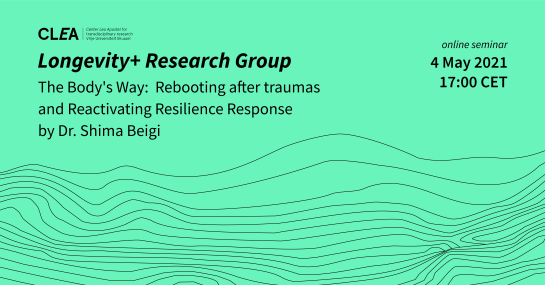We are cordially inviting you to the first seminar in a series organized by our new CLEA Longevity Plus Research Group: a transdisciplinary approach to wellbeing. The group aims to integrate and elaborate scientific approaches towards a long and happy life.
CLEA Longevity+ Research Group
The Body's WayRebooting after traumas and Reactivating Resilience Responseby Dr. Shima Beigi
Tuesday 04 May 202117:00 - 18:30 CET
Facebook event: https://fb.me/e/1F4IPcyBL
Short lived stressors have positive evolutionary advantage for the organisms (e.g. immediate survival purposes, short-term physiological and psychological adjustments ). However, they also come with significant long-term outcomes that threaten learning behaviour, health and longevity. One of the challenges of maintaining sustainable resilience is maintaining the balance between short-term and long-term adaptation responses. Traumatic situations challenge the organism's capacity for rapid recovery. The pressure of adaptive response can lead to development of maladaptive resilience curves and if continued to development of post-traumatic stress disorder and other physiological diseases and psychological dysfunctions (i.e., denial, addictive behaviours, anger, rage, etc). In other words, early adaptation responses can take a toll on the longevity of the organisms.
Adaptive responses and hence resiliency are regulated by the brain. The human brain though is not purely genetically developed. The architecture of the brain is in constant flow with its surroundings. As a result, these constant dialogues between the brain and the environment(s) have the power to establish either a resilient or a fragile organism. In short, the circuitry of the brain or the chemistry of the brain hence the resilience of the organism is mutually developed throughout the whole experience of an organism. Fragility here means vulnerable to the long-term impacts of the stressors, while resilient means capable of offsetting the long-term impacts of shocks. Health, wellbeing and longevity as subsequent outcomes of a mindful developmental journey are therefore not only shaped but also controlled by dynamics of organisms' life events, choices and the existence or lack of awareness of the consequences of those choices/decisions.
In this talk, Dr. Shima Beigi argues that developing awareness of the complexity of the stress-response and the deep interaction of the body-brain-environment triad are two critical nexus of the next generation of anti-ageing, resilience building, trauma healing research, consciousness studies and last but not least longevity practices.
Bio:Research scientist, founder of Mindfulness Engineering and director of CLEA Longevity Plus Research Group, Dr. Shima Beigi is a resilience scientist, smart city researcher, entrepreneur, TEDx speaker, fitness and bio-hacking enthusiast, Yoga Alliance certified yoga instructor, certified mindfulness and tantra coach and practitioner. She believes that the world is in a dire need of a new narrative. Her latest book, Mindful Smart Cities, provides such a story of hope for modern urban life by connecting science, spirituality and virtuality. Future of humanity is bright provided we become better at connecting different/remote ideas together, and learn how to share them through mindful and compassionate global conversation and narratives.

Read more about CLEA Well-being and Social Progress research: https://clea.research.vub.be/en/clea-longevity-plus-research-group
